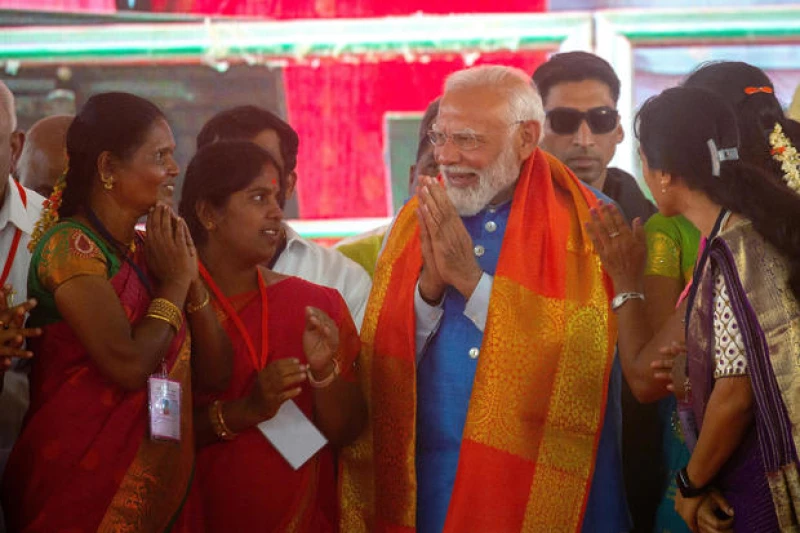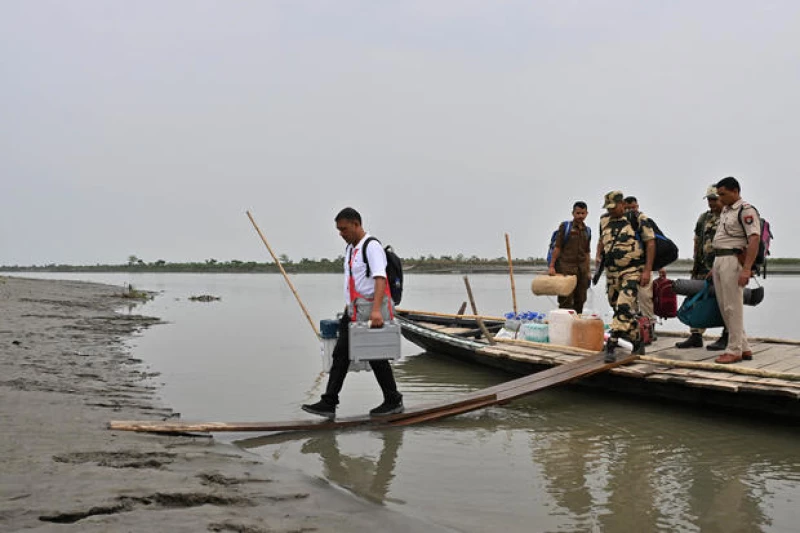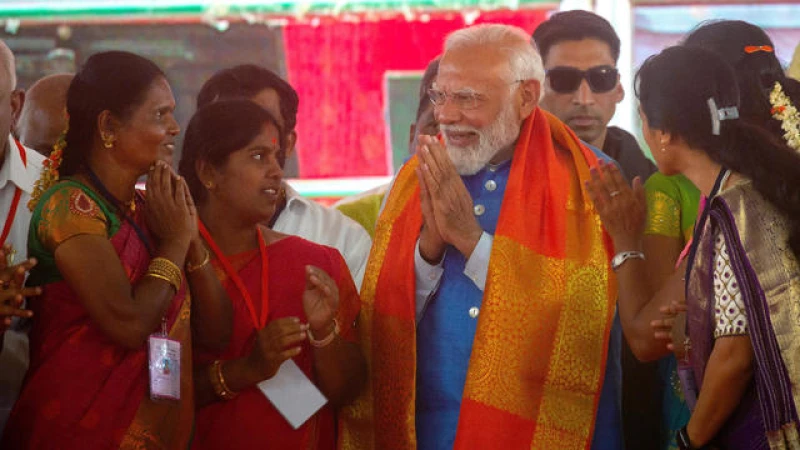New Delhi — As polls opened on Friday in India, the country embarked on what is anticipated to be the most extensive general election ever conducted globally, with nearly 1 billion eligible voters. The election is scheduled to take place in seven phases, commencing on Friday and concluding on June 1.
Results are expected to be announced on June 4.
Current Prime Minister Narendra Modi is seeking a third term in office. While pre-election polling is prohibited in India, a recent survey revealed that Modi's overall approval rating had climbed to 75% in February, marking a 15% increase over the past two years. Supporters attribute his popularity surge to his efforts in elevating India's global standing as a major power, whereas critics attribute it to his strategic pro-Hindu and anti-Muslim policies.
- Biden hosts Modi for state visit, navigating critical relations amid rights concerns

Nevertheless, victory for his party is not assured, and the stakes are high — not only for the world's most populous nation, but also for the broader principles of democracy in a region that has long been heralded as a model of political freedom in Asia.
An election of monumental proportions
India, with a population exceeding 1.4 billion, is conducting a massive election this year with 969 million eligible voters, a significant increase from the 912 million in the previous national election of 2019. To put this into perspective, the upcoming U.S. national election in November is expected to have fewer than 170 million eligible voters.
The Election Commission of India has dedicated months to preparation and has mobilized approximately 15 million election officers and security personnel to facilitate this immense democratic process.
Utilizing various modes of transportation, including horseback and elephants, Electronic Voting Machines (EVMs) are being delivered to remote areas, a journey that can take up to seven weeks due to limited infrastructure in these regions.
With a goal of ensuring accessibility, over 1 million polling stations have been established throughout India, aiming for each voter to have one within a distance of 1.24 miles from their residence. Notably, a polling booth has been erected in the Himalayan mountains at an altitude of 15,256 feet, claiming the title of the world's highest polling station.
The Election Commission plans to deploy 5.5 million EVMs for this election. While some opposition parties have expressed concerns about the security of these machines, alleging vulnerabilities to hacking and tampering, both the commission and the government assert their reliability.
What is at stake in this election?
Indians are heading to the polls to elect Members of Parliament to fill 543 seats in the 545-seat lower house of parliament, known as the Lok Sabha. The remaining two seats are appointed by the country's president. The party that secures a majority in the election will form the next government and designate one of its winning candidates as India's prime minister.
This election features six national parties, 57 state parties, and over 2,500 smaller local parties. Not all political parties contest nationally, with fewer than 12 parties collectively holding 86% of the seats in the Lok Sabha.
One prominent player in this political landscape is Modi's Hindu nationalist Bhartiya Janata Party (BJP), which has steadily gained popularity since its initial victory in 2014.
Challenging the BJP is the Indian National Congress (INC), the country's oldest political party that has held power for over 50 of India's 77 years as an independent nation.

Rahul Gandhi, leader of the Congress party and scion of a political dynasty that includes his father, grandmother, and great-grandfather as former prime ministers, stands as Modi's strongest rival and the face of the country's political opposition.
Is the election process transparent?
In a recent development, the INC party accused Modi's administration of using the tax federal agency to suppress democracy, revealing that the party's bank accounts had been frozen in a tax dispute case.
Former Congress leader Sonia Gandhi, the mother of the current party leader, denounced this move as "a systematic effort to financially cripple the party."
"We have no money to campaign. We cannot support our candidates. Our ability to fight elections has been damaged," Rahul Gandhi said.
The Congress Party also accused "autocratic" Modi's government of "capturing democracy through extortion and financial terrorism."
Modi's BJP government has denied the allegations.
Concerns have also been raised over the arrest of Arvind Kejriwal, the Chief Minister of the sprawling Delhi capital region and head of the Aam Aadmi Party (AAP), on March 21. He was taken into custody by the Enforcement Directorate (ED), India's federal financial crimes agency, in connection with an alleged money-laundering case.
AAP has called the case against Kejriwal, filed right before the national election, a "political conspiracy" and accused the ED of acting like a "political wing of BJP."
Asked on March 27 about Kejriwal's arrest and the INC's accounts being frozen, State Department spokesperson Matthew Miller said the U.S. government wouldn't comment on "private diplomatic discussions," but he stressed that "we encourage fair, transparent, and timely legal processes for each of these issues."
India called the U.S. government's remarks about the issues "unwarranted" and "unacceptable," and said India was proud of its independent and robust democratic institutions.
Modi and the Hindu-Muslim divide
During his time in office, Modi's critics argue that he has not made significant efforts to bridge the growing sectarian divide between India's majority Hindu population and its 230 million Muslims.
Instead, some critics believe that he has indirectly supported sectarianism to gain favor among his Hindu nationalist supporters.
There are concerns about what a potential third term for Modi could mean for India's Muslims, with fears that his party, the BJP, aims to transform the secular and pluralistic nation into a Hindu-majority state.
Over the past decade under BJP leadership, there has been a noticeable increase in sectarian violence in India, often targeting Muslims and Christians.
The BJP denies allegations of fueling sectarianism and asserts that it works for the welfare of all Indian citizens without discrimination.







